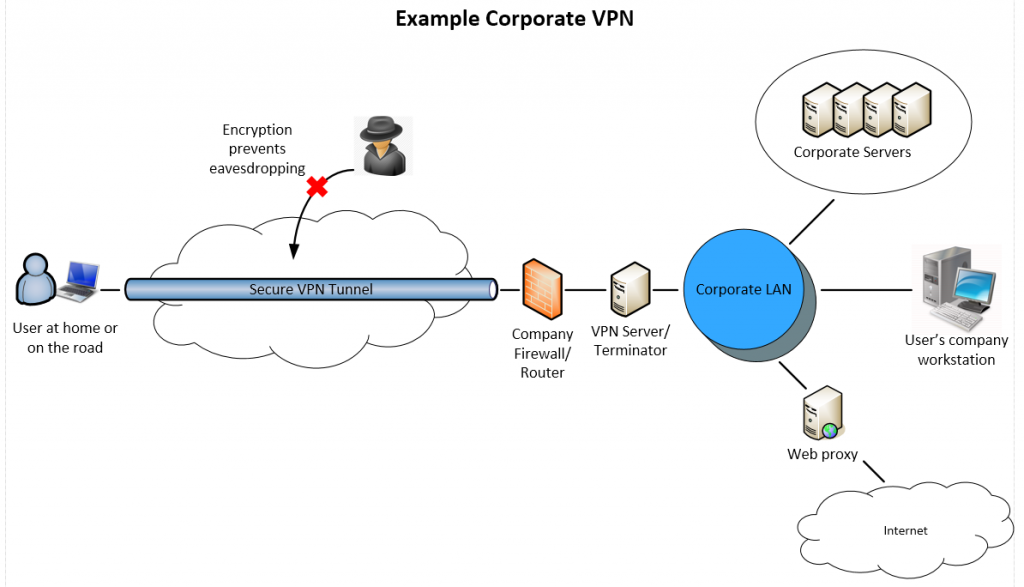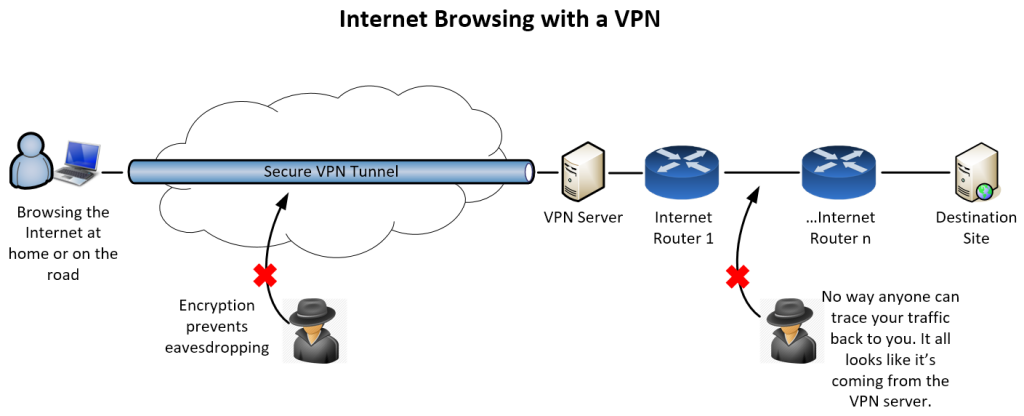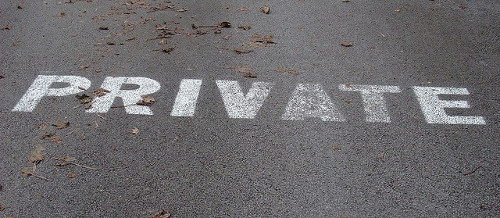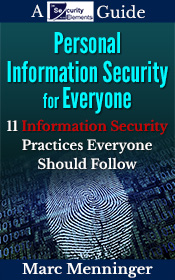One way to prevent other people from being able to eavesdrop on your online transactions is by ensuring that your browser is using HTTPS (as I describe in my ebook “More Information Security for Small Businesses”). Another way to protect your transactions is to use a personal Virtual Private Network or VPN. As you might gather from the name, a VPN is a safe way to extend your private (and presumably secure) network across the Internet.
When using a VPN, your computer will connect to your private network over the Internet via strong authentication and encryption or tunneling protocols. Once connected, you’ll get the benefit of access to your private networked systems such as file servers as well as the benefit of operating from a secure network versus the non-secure Internet. With a VPN, a remote worker could securely access the company network file servers in Seattle, for instance, from a coffee shop in Chicago.
If you have to remotely access a personal or business network, using a VPN connection is the secure way to go. VPNs can also be used to securely connect two different networks—such as two geographically separated offices—to each other.
Here’s a representation of a typical corporate VPN:

While VPNs are common for businesses to provide secure remote access for their employees, security-minded individuals can use personal VPNs to:
- secure their wireless transactions and prevent eavesdropping with strong encryption
- get around geographic network restrictions or censorship
- connect to proxy servers to hide their identity and location
One of the most popular reasons why people use VPN services is to protect their privacy. Many people feel that regular Internet access doesn’t provide adequate privacy controls. That means there are many opportunities for outsiders such as hackers, government agencies, and even your own ISP to watch what you’re doing online. Even if you think you’re not doing anything worth spying on, there are plenty of reasons why regular people should be thoughtful about their online privacy as Glenn Greenwald talks about in his TEDTalk here: http://bit.ly/PrivacyTEDTalk.
Here’s what a typical Internet browsing session looks like:

As you can see, there really isn’t any privacy or security with regular Internet browsing.
Here’s what Internet browsing with a personal VPN looks like:

Some people use VPNs just to watch streaming media such as TV shows in different countries that are blocked outside of those countries. For instance, if you don’t live in the US, there are many streaming Netflix shows that are blocked for you. Using a VPN allows you to live in another country, say Germany, and select a US VPN server that will make it look like your traffic is coming from the US. Then you can watch all the Netflix shows you like.
There are many personal VPNs to choose from. Some criteria you’ll want to consider when selecting a VPN provider include:
- Price: You can expect to pay between nothing to around $10 per month for personal VPN services. While there are free VPN services such as CyberGhost or Hotspot Shield VPN, the services they offer are naturally limited when compared to those with a monthly fee. You’ll also probably be forced to watch ads and be disconnected after several hours of using the VPN with a free service.
- Bandwidth: You could potentially use a lot of bandwidth with your VPN service, especially if you want to avoid streaming media geoblocking. If you think bandwidth limits could be an issue, you’ll want to find a VPN service with very high bandwidth allowances or no bandwidth restrictions at all.
- Provider location: Many people have privacy concerns about VPN providers based in the US. This site explains some of the reasons why people have these concerns. If you want VPN providers with the highest levels of privacy, you’ll want to consider those outside the US and even UK.
- Server locations: Where the VPN service provider’s servers are located can be important depending on what you plan to use your VPN for. If you intend to avoid streaming media geoblocking, you’ll want to make sure your VPN service has servers in the country you want to stream media from.
- Number of connections: If you’re going to use a VPN to protect your Internet transmissions, you’ll probably want to use it with every device you have that connects to the Internet. That could be an issue if your VPN service limits your number of connections to just one or two. Some VPN services have no connection limits. One way to get around connection limits is to configure your home’s wireless router to connect to your VPN service permanently. Doing this requires a little bit of technical savvy, but once set up, your wireless router will only count as one connection to the VPN no matter how many devices on your home network connect to the router.
- Smartphone compatibility: Most smartphones have the capability to run their data over VPNs either natively or through apps like OpenVPN. Some VPN service providers like NordVPN and BlackVPN also have their own smartphone apps which may be easier to use than other VPN apps. If using a VPN with your smartphone is important to you, you’ll want to check to see if your VPN provider has an app available for it.
- Encryption protocols: VPN technology has been around for years and there are some older forms of VPN encryption like PPTP that are no longer considered secure. Strong VPN encryption protocols include L2TP/IPSec and OpenVPN. You’ll want to ensure your VPN service provider gives you the option of using one of these.
- Customer privacy: One of the main reasons why many people use VPNs is to protect their privacy. They want to go to any website without being tracked by their ISP or anybody else. This is why some VPN service providers promise not to keep logs on their users’ activities. If privacy is important to you, make sure your VPN provider doesn’t keep logs.
- Trial option: Some VPNs, like NordVPN, offer free trials of their service. Usually you have to contact their support team and request it and it will probably only be for a few days, but it should be enough time to give the service a fair evaluation and see if it will work for you. If a VPN service doesn’t have a free trial, there’s a good chance that it will have a short subscription option at a low price which is another way to test the service without spending a lot of money.
There are many good VPN service providers that meet all of these criteria. The challenge may be selecting the one that’s right for you. You can use VPN review sites like vpnreviews.com to look at customer feedback on different VPN service providers. Just keep in mind that this and other VPN review sites are driven by ad and affiliate revenue, so they may not be the most unbiased sources.
You can find a list of VPNs which meet the highest privacy criteria on the PrivacyTools.io page. All of these VPNs are outside of the US, have a no logging policy, support OpenVPN, and accept Bitcoin if you really want to make sure no one is tracking your use of a VPN.
As an alternative to buying a VPN service, you could build your own VPN on your home network by setting up a VPN server. You’ll probably save money in the long-run, but you’ll need to think about how much effort it will be to set up a home VPN and if it’s worth the hassle. This article does a good job of describing what’s involved with setting up your own VPN.
Personally, I use AirVPN (affiliate link) because it’s easy to use, has strong privacy protections, and isn’t too expensive. It’s not hard to find other VPN service providers that offer similar levels of service, though. The key is to find one that’s right for you and start using it if you want to maximize your online security and protect your privacy.
Photo credit: James Cridland




